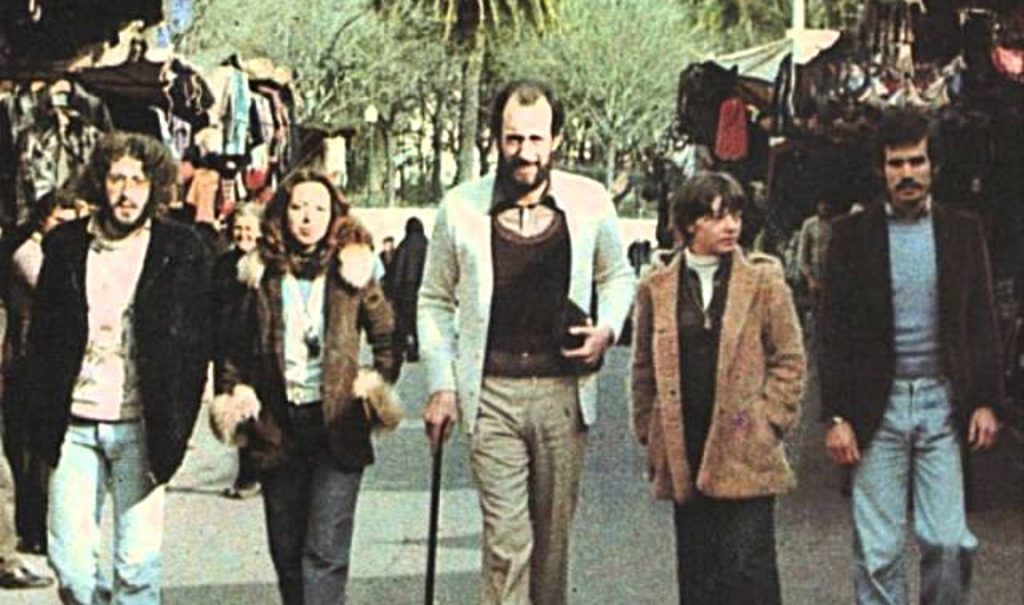Bric-à-Brac is a Portuguese music group. Their name is a reference to the French term for collections of old artistic objects.
Background
Manuel José Soares (1948–2013) participated in the Festival RTP da Canção in 1970 as a member of Duo Opheu (with Vítor Leitão). When the group ended, they ultimately did not take part in the 1974 festival.
Manuel José Soares, his wife Isabel Soares, and three other members (Carlos Pereira, Ana Veloso, and Fernando Falé) formed Bric-à-Brac. The group’s first single included the tracks “Bric À Brac” and “De Norte A Sul.”
In 1977, they took part in that year’s Festival RTP da Canção, renamed “As Sete Canções” (“The Seven Songs”) on TV, where the finalist songs were performed in two versions. The group’s rendition of “Fim de Estação” was one of the most voted, placing 3rd. They released the EP “Quatro Das 7 Canções”, which included versions of some of the other competing songs.
In the 1978 edition of the Festival RTP da Canção, only three artists participated (Tonicha, José Cid, and Gemini), each performing four songs. Orfeu released a record with Gemini’s songs — “O Circo e A Cidade,” “Tudo Vale A Pena,” “Ano Novo É Vida Nova,” and “Dai-Li Dai-Li Dou” — as interpreted by Bric-à-Brac (then a quartet), while Florência performed Tonicha’s songs.
The group released the album “Isto é Espectáculo!” featuring the tracks:
- “Isto É Espectáculo”
- “É o Cabaret”
- “O Boxe”
- “A Magia do Circo”
- “O Travesti”
- “Segunda Parte”
- “Tu, Charlot”
- “Futebol, Futebol”
- “Os Saltimbancos”
- “Isto É Espectáculo (Final)”
Also in 1978, they released the single “O Baile Dos Bombeiros”, produced by José Cid.
In 1979, the members decided to compete individually in the Festival RTP da Canção:
- Isabel Soares with “Cantiga de Amor”
- Manuel José Soares with “Quando Chego A Casa”
The group won the 1st Festival da Nova Canção de Lisboa with “Hino A Lisboa.”
A new formation of Bric-à-Brac emerged with Isabel Soares, Manuel José Soares, Jorge Barroso, and Paula Carreira. Manuel José Soares was a finalist at the Festival RTP da Canção in 1980 with “Concerto Maior”, while Bric-à-Brac competed with the song “Música Portuguesa.”
They recorded a new LP featuring versions of Festival RTP da Canção classics:
- “Oração”
- “Sol de Inverno”
- “O Vento Mudou”
- “Verão”
- “Desfolhada”
- “Onde Vais Rio Que Eu Canto”
- “Canção de Madrugar”
- “Menina do Alto da Serra”
- “Cavalo à Solta”
- “Flor Sem Tempo”
- “Festa da Vida”
- “Tourada”
- “E Depois Do Adeus”
- “Madrugada”
- “Uma Flor de Verde Pinho”
- “No Teu Poema”
- “Portugal no Coração”
- “Rita Rita Limão”
- “Daili Daili Dou”
- “Sobe Sobe Balão Sobe”
They placed 5th in the Festival RTP da Canção 1981 with “Daqui Deste País.”
In 1982, Paula Carreira left the group and was replaced by Cristina Águas. That year, they reached 9th place in the festival with “Tudo Tim Tim Por Tim Tim.” Manuel José Soares also wrote “Banha Da Cobra, Estica E Não Dobra” for the group Broa de Mel. They released the single “Pic-nic.”
In 1984, Isabel Soares competed solo in the Festival RTP da Canção with the song “O Nosso Reencontro.”






Os Bric-à-Brac foram um grupo musical português ativo nas décadas de 1970 e 1980, fundado por Manuel José Soares e Isabel Soares, com uma sonoridade que mesclava elementos de música popular portuguesa com influências de cabaré e teatro musical.
Participaram em várias edições do Festival RTP da Canção, destacando-se com a canção “Fim de Estação”, que alcançou o 3.º lugar em 1977. Além disso, lançaram o álbum “Isto é Espectáculo!” e o single “O Baile Dos Bombeiros”, produzido por José Cid.